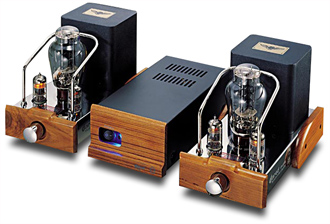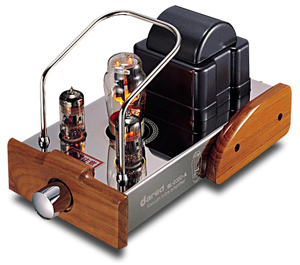Dared Mini SL-2000A
Preamplifier and Mini VP-300B Mono Amplifiers
 Dared is a ten-year-old
company that originally concentrated on transformer design and manufacture, but since the
late ‘90s has also produced tube amplifiers. Their four product lines -- Flagship,
Imperial, Mini, and New Classic -- look pretty much the same but range greatly in price.
The products I was sent for review, all from the Mini line, included a pair of VP-300B
monoblock power amplifiers ($980/pair USD) and the SL-2000A preamplifier ($399). Dared is a ten-year-old
company that originally concentrated on transformer design and manufacture, but since the
late ‘90s has also produced tube amplifiers. Their four product lines -- Flagship,
Imperial, Mini, and New Classic -- look pretty much the same but range greatly in price.
The products I was sent for review, all from the Mini line, included a pair of VP-300B
monoblock power amplifiers ($980/pair USD) and the SL-2000A preamplifier ($399).
Stylin’ and profilin’
The Mini preamp and amplifiers share a petite, attractive
appearance that is a far cry from the black-box aesthetic favored by too many electronics
companies. Each model has a mirror-finish metal chassis with sculpted wood sides and, on
top, exposed tubes and transformers. Each amp has a single rod arching over all the tubes,
but it’s not a tube cage that would protect you, your pets, and your children from
the tubes, and vice versa.
Each VP-300B amp measures almost 7" high by 5.5"
wide by 11" deep; the SL-2000A preamp is of the same length and width but is only
5.5" high. The mirror finish helps reflect the warm glow of the tubes when everything
is powered up and operating. These components will look good wherever you put them, and
will likely have a high spousal approval factor. Even your nonaudiophile friends might ask
about them.
The VP-300B is a single-ended class-A amplifier that Dared
claims puts out 6W of power. This low output figure might surprise those used to buying
multi-hundred-watt amplifiers, but there is an active group of hobbyists who swear by amps
of such little power. In a single-ended amp the entire audio signal is amplified by a
single tube, in contrast to more modern "push-pull" designs in which the
signal’s positive and negative halves are divided between equal numbers of tubes or
transistors. Part of the appeal of single-ended amplifiers is that they permit very simple
circuit designs. The enthusiasts argue that, with fewer electronics in the signal path,
single-ended amplifiers stand a chance of having better fidelity to the original signal.
One thing to keep in mind when auditioning single-ended
amplifiers is that they may be much more finicky than push-pull designs about the speakers
they’re willing to drive. If you’re thinking of adding low-powered amps to your
current speakers, then it’s imperative that you audition the amps with your
speakers. In general, look for speakers of high sensitivity and friendly impedance. The
low-powered amps are unlikely to have enough power to drive speakers of low sensitivity.
 Each VP-300B has three tubes: two
12AU7s and one 300B. The 300B is a large, bulbous tube with a long history in audio
design. The use of contemporary 300B designs first gained popularity in Asia and moved to
North America in recent years. Each VP-300B also has a volume knob, which allows you to
use it directly with a single source. (If you have more than one source, you’ll need
a separate preamplifier.) This knob and the amps’ shared power supply explain
Dared’s labeling them "quasi-monoblocks." On the rear panel is a single RCA
jack for input from a source or preamp, a receptacle for the cord that connects it to the
power supply, and three speaker terminals: ground, 4 ohms, and 8 ohms. Each VP-300B has three tubes: two
12AU7s and one 300B. The 300B is a large, bulbous tube with a long history in audio
design. The use of contemporary 300B designs first gained popularity in Asia and moved to
North America in recent years. Each VP-300B also has a volume knob, which allows you to
use it directly with a single source. (If you have more than one source, you’ll need
a separate preamplifier.) This knob and the amps’ shared power supply explain
Dared’s labeling them "quasi-monoblocks." On the rear panel is a single RCA
jack for input from a source or preamp, a receptacle for the cord that connects it to the
power supply, and three speaker terminals: ground, 4 ohms, and 8 ohms.
The VP-300Bs come with a single shared outboard power
supply. This has a power switch with a blue LED on a wooden front that matches the front
and side panels of the other Mini components, and is roughly the same size. On the rear is
a power-cord receptacle, as well as inputs for the interconnects from each amp.
The Mini SL-2000A preamplifier, like the Mini VP-300B, also
uses three tubes: one 5Z4P and two 12AT7s. The front panel has only a volume knob; the
power switch and input selector are small switches on the top plate, near the rear. The
rear panel has two pairs of RCA inputs, a power-cord receptacle, and RCA outputs. The
SL-2000A comes with a small remote control through which you can adjust the volume but not
select the source. If you’re a complete couch potato you’re out of luck, but if
you usually put a CD or LP on and then listen all the way through, then the lack of remote
input selection won’t be missed. The remote itself more resembles the one that locks
my minivan’s doors than the usual audio remote. It’s only a couple of inches
long and wide, has two buttons with Up/Down arrows, a red LED, and a hole so you can put
it on your keychain. Why you’d want to do that, I don’t know.
Listening
I began my auditioning with some casual listening after
attaching my Audiovox Sirius Radio plug’n’play tuner directly to the VP-300B
power amplifiers. The sound was pleasant and did not call attention to the sonic
shortcomings sometimes exhibited by the satellite service. While listening, I
couldn’t help but think that these amps and preamp, connected to a small satellite
tuner and an iPod, would make a quite enjoyable and chic compact music system for small
spaces.
For critical listening, I connected the SL-2000A preamp to
my Rotel RCD-1070 CD player using Analysis Plus Solo Crystal Oval interconnects. Another
pair of the same wires connected the preamp to the amps, and the amps drove a pair of Quad
21L loudspeakers via Analysis Plus Big Silver Oval speaker cables. The Quads’
sensitivity rating of 88dB was probably on the low side for the low-powered Dareds, so
after a while I switched in a pair of Axiom M22ti bookshelf speakers, which have a
slightly higher sensitivity rating.
On the first two tracks of The Best of Randy Newman
[CD, Warner Archives/Rhino R2 74364], the cymbal decays were impressive, though the
midrange sounded a bit recessed. The bass was tuneful, if not as deep or as controlled as
when I replaced the Dared preamp and amps with my Rogue Audio Tempest integrated amplifier
($2195). Some instruments actually sounded present in the room with the Dared, such as the
drums and cymbals. The Rogue, by contrast, had more midrange presence. To be fair,
however, the Rogue is over $800 more expensive than the Dared combo.
I then listened to Hélène Grimaud’s recording of
Beethoven’s Piano Sonata 17 in D Minor, Op.31 No.2, "The Tempest," from Credo
[CD, Deutsche Grammophon B0001732-02]. The piano sounded delicate as it should have. On
the rest of the disc, the Dareds conveyed well the sense of physical space. While the
dynamics weren’t stellar, the instruments were clearly delineated in their own
spaces, and the piano didn’t get lost in the shuffle between choir and orchestra.
Madeleine Peyroux’s Careless Love [CD, Rounder
11661-3192-2] sounded quite real through the Dared setup. On the title track, instruments
were well defined in a believable space, and Peyroux’s voice was lifelike. I was also
able to hear small, incidental sounds that I hadn’t heard or paid attention to
before. The Great Jazz Trio’s Someday My Prince Will Come [CD,
Eighty-eights/Columbia CK 92819] opens with Duke Ellington’s "Caravan" and
Elvin Jones’ deft drumming. I continued to like cymbals as reproduced by the Dared
combo, and Elvin’s brother Hank’s piano was believable.
The Dared combo opened an intimate window on the
recordings, following the music’s emotional ebb and flow while avoiding
hyperrealistic sound. The Dareds provided an intimate portrait of the music, as if I
listened in on the recording sessions without anyone knowing. If you’re looking for a
system for an office, apartment, dorm room, or bedroom, this combo may be it.
Toward the end of my listening session I noticed that if I
tapped the preamp’s volume knob I could hear the tap through my right speaker. I then
listened even more critically, and noticed that if I turned down the volume all the way I
heard a low buzz in the right speaker; the left was silent. Neither the audible tap nor
the nearly inaudible buzz affected my enjoyment, and I don’t know if this was a
glitch in the review unit or whether it’s a more general design or production flaw.
Buyers may want to check this out while their warranties are still in effect.
Conclusion
Maybe not everyone loves a pair of sexy little tube amps,
but I’m one of those who do. Whether these Dared Mini models will be right for you
will depend on at least three variables.
First, the VP-300B’s performance was much more
dependent on choice of speaker than that of most other amps -- I wish I’d had more
speakers on hand to test them with. No one should buy a pair of VP-300Bs until
they’ve heard them with the speakers they intend to drive them with. This may be
simply a byproduct of single-ended amps rather than this particular model, but it’s
still something to consider. Second, with only one input, or two if you use the companion
preamp, the number of sources you can use is limited.
Third and last, consider your listening habits. Rock out at
ear-splitting volumes? Look elsewhere. Conduct the LSO right in your living room? These
Dareds might not have enough oomph. Enjoy intimate small-group jazz, pop, folk, or
chamber music? Give these a listen right away.
...Eric D. Hetherington
Prices of equipment reviewed
|